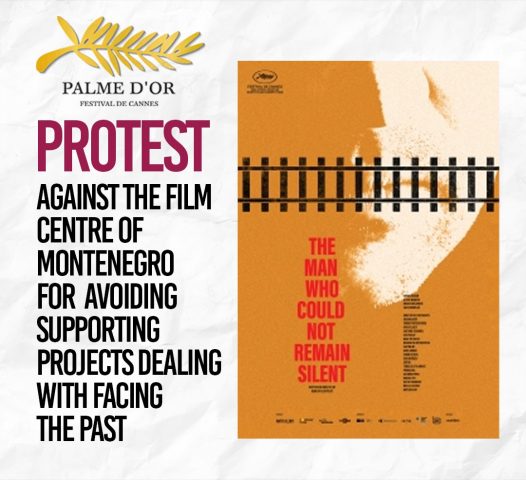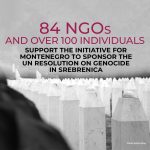- HRA kontakt
- Tel: +382 20 232 348
- hra@t-com.me
Protest against the Film Centre of Montenegro for avoiding supporting projects dealing with facing the past

DETERMINE ACCOUNTABILITY FOR THE EXPIRATION OF OVER 2,000 “FORGOTTEN” CRIMINAL CASES IN THE PROSECUTOR’S OFFICE
31/05/2024
Why is the status of civilian war victims still unregulated?!
04/06/2024Protest against the Film Centre of Montenegro for avoiding supporting projects dealing with facing the past

Five non-governmental organizations sent a protest letter yesterday to the director of the Film Centre of Montenegro (FCCG) – Aleksandra Božović, and the president of the FCCG Council – Edin Jašarović, demanding an explanation for why they did not support the project The Man Who Could Not Remain Silent, directed by Nemanja Slijepčević, winner of the Palme d’Or at the 77th International Film Festival in Cannes.
Miloš Avramović, producer from Serbia, Montenegrin director Dragutin (Draško) Đurović, and Montenegrin actor Momčilo Otašević are expert consultants who did not consider that the project, backed by a respectable film and production team and focusing on confronting the wartime past, specifically the war crime of the abduction of passengers from the train in Štrpci in February 1993, in which eight Montenegrin citizens were killed, should receive financial support.
The FCCG Council, chaired by Edin Jašarović, unanimously adopted the proposal of the expert consultants. The Council members include business psychologist and journalist Irena Tatar, actor Slaviša Čurović, writer and television author Bogić Rakočević, and FCCG representative Danijela Radulović.
According to the Rulebook on Co-financing the Production of Cinematographic Works, expert consultants for film activities are proposed by the FCCG director, appointed by the FCCG Council, which also adopts the decision on their project financing proposals.
The FCCG also previously did not support the film Quo Vadis, Aida? by director Jasmila Žbanić, which deals with the topic of the genocide in Srebrenica. This film also won top awards at international festivals and was nominated for an Oscar.
We asked the FCCG whether the failure to recognize these film projects is due to beliefs opposed to respecting human rights and the suffering of victims of war crimes, or if there is another reason for the oversight in supporting these works of outstanding cultural-historical significance.
The FCCG also previously did not support the film Quo Vadis, Aida? directed by Jasmila Žbanić, which deals with the topic of the genocide in Srebrenica. This film also won top awards at international festivals and was nominated for an Oscar.
We asked the FCCG whether the failure to recognize these film projects is due to beliefs opposed to respecting human rights and the suffering of victims of war crimes, or if there is another reason for the oversight in supporting these works of outstanding cultural-historical significance.
There is an evident lack of sensitivity towards artistic works that have the potential to raise awareness within society, encourage confronting the wartime past, and provide conditions for reconciliation and lasting peace in the Balkans.
Speaking about war through art represents a precious way to preserve truth from oblivion and reach a larger audience, especially younger generations, thus the Film Centre of Montenegro should provide support precisely to such projects.
We expect to be informed about what will be done to ensure that such oversights do not happen again.
Human Rights Action (HRA)
Centre for Civic Education (CCE)
Center for Women’s and Peace Education ANIMA
Montenegrin Committee of Lawyers for Human Rights
Association “Štrpci – Against Forgetting”







 English
English